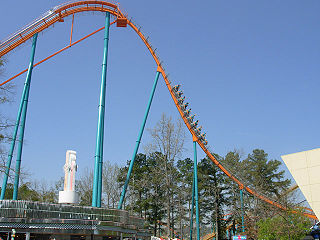
David Eric Grohl is an American musician. He founded the rock band Foo Fighters, of which he is the lead singer, guitarist, and principal songwriter. From 1990 to 1994, he was the drummer of the grunge band Nirvana.

Goliath is a Philistine giant in the Book of Samuel. Descriptions of Goliath's immense stature vary among biblical sources, with various texts describing him as either 6 ft 9 in (2.06 m) or 9 ft 9 in (2.97 m) tall. According to the text, Goliath issued a challenge to the Israelites, daring them to send forth a champion to engage him in single combat; he was ultimately defeated by the young shepherd David, employing a sling and stone as a weapon. The narrative signified King Saul's unfitness to rule, as Saul himself should have fought for the Kingdom of Israel.

Oliver Taylor Hawkins was an American musician who was the drummer and a vocalist of the rock band Foo Fighters, sharing vocals with Dave Grohl. He joined the band in 1997, and remained the band's drummer until his sudden death in 2022. He recorded eight studio albums with Foo Fighters between 1999 and 2021. Before joining the band, he was a touring drummer for Sass Jordan and Alanis Morissette, as well as the drummer of the progressive experimental band Sylvia.
Quiz Holdings, LLC, doing business as Quiznos, is an American franchised fast-food restaurant based in Denver that specializes in offering toasted submarine sandwiches. It was founded in 1981 by Jimmy Lambatos and sold to Rick and Richard Schaden ten years later. It then grew to nearly 5,000 restaurants; by 2013, Quiznos was the second-largest submarine sandwich shop chain in North America, behind Subway. It filed for bankruptcy in 2014; by 2016, it had dropped to ninth place, and the number of Quiznos locations in the United States fell from a 2007 high of 4,700 to just 400 a decade later.

The Foo Fighters are an American rock band formed in Seattle in 1994. Founded as a one-man project by former Nirvana drummer Dave Grohl, the lineup now consists of Grohl, Nate Mendel (bass), Chris Shiflett and Pat Smear (guitars), Rami Jaffee (keyboards), and Josh Freese (drums). Drummers William Goldsmith and Taylor Hawkins, along with guitarist Franz Stahl, are former members of the band.
Greencore Group plc is a food company in Ireland. It was established by the Irish government in 1991, when Irish Sugar was privatised, but today Greencore's products are mainly convenience foods, not only in Ireland but also in the United Kingdom. A major supplier to British and Irish supermarkets, Greencore is the largest sandwich manufacturer in the world. It is listed on the London Stock Exchange and is a constituent of the FTSE 250 Index.

In Your Honor is the fifth studio album by American rock band Foo Fighters, released on June 14, 2005, through Roswell and RCA Records. It is a double album, with the first disc containing heavy rock songs and the second containing mellower acoustic songs. Frontman Dave Grohl decided to do a diverse blend of songs, as he felt that after ten years of existence, the band had to break new ground with their music. The album was recorded at a newly built studio in Northridge, Los Angeles, and features guests such as John Paul Jones, Norah Jones, and Josh Homme. Its lyrics deal with both resonating and introspective themes, with a major influence from Grohl's involvement on the campaign trail with John Kerry during the 2004 presidential election. It was the first album to feature keyboardist Rami Jaffee, although he would not join the band as full-time member until 2017.

Alex Steffen is an American futurist and advocate of 'bright green environmentalism' who writes and speaks about sustainability and the future of the planet. He emphasizes the importance of imagining persuasive, positive possible futures: "It's literally true that we can't build what we can't imagine,... The fact that we haven't compellingly imagined a thriving, dynamic, sustainable world is a major reason we don't already live in one."
Apache Velocity first released in April 2001, is a Java-based template engine that provides a template language to reference objects defined in Java code. It aims to ensure clean separation between the presentation tier and business tiers in a Web application.
Mark Porter is a British publication designer and art director, and former creative director of The Guardian. Formerly he was the art director of the Evening Standard, the UK edition of Wired, and Colors. He directed the redesign of The Guardian, which was voted best-designed newspaper in the world by the US-based Society for News Design in 2006.
Sandwich is a Filipino alternative rock band from the Philippines formed by Raymund Marasigan and Diego Castillo. The band currently consists of lead vocalist Raymund Marasigan, guitarists and backing vocalists Diego Castillo and Mong Alcaraz, bassist Myrene Academia and drummer Mike Dizon.

Goliath is a steel roller coaster located at the Six Flags Over Georgia amusement park in Cobb County, Georgia. The Hyper Coaster model manufactured by Bolliger & Mabillard climbs to a height of 200 feet (61 m) and reaches a maximum speed of 70 mph (110 km/h). Prior to its construction, the Great Gasp and Looping Starship attractions were removed to make room for Goliath, which opened to the public on April 1, 2006. It ranked as the fourth-best new ride of 2006 in the annual Golden Ticket Awards publication from Amusement Today and the ninth-best steel roller coaster overall, with its peak ranking of fourth occurring in 2009 and 2011.

Goliath is a steel roller coaster at La Ronde amusement park in Montreal, Quebec, Canada. Designed by Bolliger & Mabillard, it reaches a maximum height of 174.8 feet (53.3 m), a speed of 68.4 miles per hour (110.1 km/h) and a track length of 4,038.8 feet (1,231.0 m). Construction commenced in September 2005, and the roller coaster opened to the public on May 13, 2006. Goliath was the tallest and fastest roller coaster in Canada until it was surpassed by Behemoth, at Canada's Wonderland in 2008. Six Flags announced in 2016 that Goliath would be hooked up with Virtual Reality for a New Revolution experience for the 2016 season.
As far back as the 1970s, international fast food restaurant chain Burger King has attempted to introduce a premium line of burgers. These sandwiches are part of a system which eventually became known as the barbell strategy; a plan designed to expand Burger King's menu with both more sophisticated, adult-oriented fare along with products that are more value-oriented. This program is intended to bring in a larger, more affluent adult audience who will be willing to spend more on the better quality products on one side while maintaining a lower cost value menu dedicated to a more cost-conscious audience on the other. The hope is that the customers would be drawn in initially for the lower prices of the value-menu and upgrade to the more expensive products, upping overall sales.

When the predecessor of international fast food restaurant chain Burger King (BK) first opened in 1953, its menu predominantly consisted of hamburgers, French fries, soft drinks, milkshakes, and desserts. After being acquired by its Miami, Florida franchisees and renamed in 1954, BK began expanding its menu by adding the Whopper sandwich in 1957, and has since added non-beef items such as chicken, fish, and vegetarian offerings, including salads and meatless sandwiches. Other additions include a breakfast menu and beverages such as Icees, juices, and bottled waters. As the company expanded both inside and outside the United States, it introduced localized versions of its products that conform to regional tastes and cultural or religious beliefs. To generate additional sales, BK occasionally introduces limited-time offers of special versions of its products, or brings out completely new products intended for either long- or short-term sales. Not all of these products and services have been successful; in 1992, Burger King introduced limited table service featuring special dinner platters, but this concept failed to generate interest and was discontinued.

Mandlakayise John Hlophe is a South African jurist and politician, currently serving as the Deputy President of uMkhonto weSizwe and the Leader of the Opposition of South Africa. He was the Judge President of the Western Cape Division of the High Court of South Africa from May 2000 until March 2024, when he was impeached. He was the first South African judge to be impeached under the post-apartheid Constitution.

Vivid Imaginations is a British toy manufacturer, distributor and wholesale company, based in Guildford, Surrey.

"Best of You" is a song by American rock band Foo Fighters, released as the lead single from the band's fifth studio album, In Your Honor (2005). Dave Grohl notes that the song was written following appearances at 2004 American presidential candidate John Kerry's campaign trail and is "about breaking away from the things that confine you". The song holds the band's highest chart peak in the U.S., the UK, and Australia, and was nominated for a Grammy Award for Best Rock Song. The song won the Kerrang! Award for Best Single. It also topped Billboard's Hot Mainstream Rock Tracks chart for four weeks and Hot Modern Rock Tracks chart for seven weeks. Following the band's performance at Live Earth, the song again entered the UK charts at number 38.












